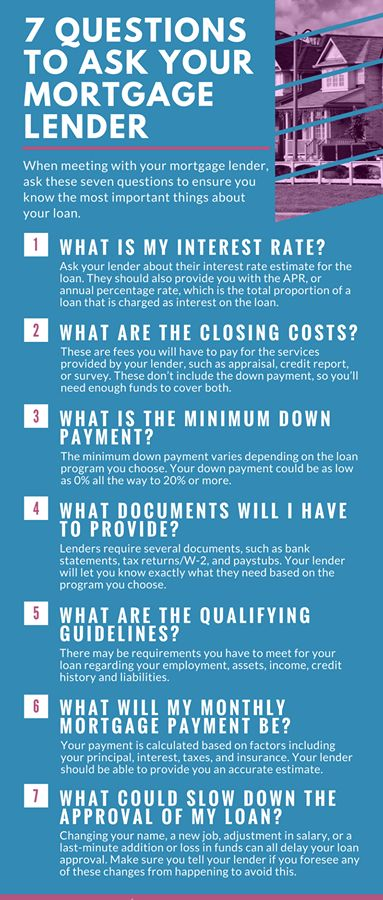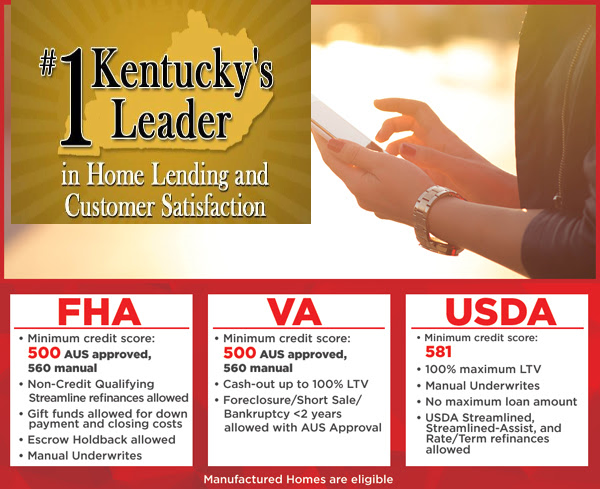What documents do I need to prepare for my Kentucky Mortgage loan application?
Below is a list of documents that are required when you apply for a mortgage. Every situation is different so you may be required to provide less or more documentation.
Sometimes a document you provide will promote us to ask for something additional. This is a normal part of the process and does anything mean that anything is wrong.
Your Property
· Copy of signed sales contract including all riders and addendums.
· Verification of the deposit when you made your offer.
· Names, addresses and telephone numbers of your realtor, builder, insurance agent and attorney (if involved).
Your Income
· Copies of your pay-stubs for the most recent 30-day period and year-to-date.
· Copies of your W-2 forms for the past two years.
· Names and addresses of all employers for the last two years.
· Letter explaining any gaps in employment in the past 2 years.
· Green card or visa (copy of front & back)
If you are self-employed or receive commission or bonus, interest/dividends, or rental income:
· Full tax returns for the last two years including attached schedules and statements. If you have filed an extension, please supply a copy of the extension
· Year-to-date Profit and Loss statement.
· K-1's for all partnerships and S-Corporations for the last two years.
· Completed and signed Federal Partnership (1065) and/or Corporate Income Tax Returns (1120) including all schedules, statements and addenda for the last two years. (Required only if your ownership position is 25% or greater.)
If you will use Alimony or Child Support to qualify:
· Divorce decree or court order stating amount, as well as, proof of receipt of funds for last year.
If you receive Social Security income, Disability or VA benefits:
· Award letter from that organization.
Source of Funds and Down Payment
· Sale of your existing home - Settlement/Closing Statement. (You won't have this until you close on your current home)
· Savings, checking or money market funds - bank statements for the last 2 months.
· Stocks and bonds -
most recent statement.
· Gifts - If part of your cash to close, provide Gift Letter (ask us and we will provide one for you)
Debt or Obligations
· Prepare a list of all names, addresses, account numbers, balances, and monthly payments for all current debts with copies of the last three monthly statements
· Include all names, addresses, account numbers, balances, and monthly payments for mortgage holders and/or landlords for the last two years
· If you are paying alimony or child support, include marital settlement/court order stating the terms of the obligation
When should I refinance?
It's generally a good time to refinance when mortgage rates are 2% lower than the current rate on your loan. It may be a viable option even if the interest rate difference is only 1% or less. Any reduction can trim your monthly mortgage payments. Example: Your payment, excluding taxes and insurance, would be about $770 on a $100,000 loan at 8.5%; if the rate were lowered to 7.5%, your payment would then be $700, now you're saving $70 per month. Your savings depends on your income, budget, loan amount, and interest rate changes. Your trusted lender can help you calculate your options.
What are points?
A point is a percentage of the loan amount, or 1-point = 1% of the loan, so one point on a $100,000 loan is $1,000. Points are costs that need to be paid to a lender to get mortgage financing under specified terms. Discount points are fees used to lower the interest rate on a mortgage loan by paying some of this interest up-front. Lenders may refer to costs in terms of basic points in hundredths of a percent, 100 basis points = 1 point, or 1% of the loan amount.
Should I pay points to lower my interest rate?
Yes, if you plan to stay in the property for a least a few years. Paying discount points to lower the loan's interest rate is a good way to lower your required monthly loan payment, and possibly increase the loan amount that you can afford to borrow. However, if you plan to stay in the property for only a year or two, your monthly savings may not be enough to recoup the cost of the discount points that you paid up-front.
What is an APR?
The annual percentage rate (APR) is anot the interest rate you pay. The APR reflects the costs of obtaining a mortgage as a yearly rate. It is usually higher than the note rate, or advertised rate, because it takes into the costs. Because APR calculations are affected by the various different fees charged by lenders, a loan with a lower APR is thought to be a better deal, but that's not always true.
The best way to know what is the best deal fo ryou ist to obtain a cost analysis from your lender so you can compare different options side-by-side.
Ask us for your analysis.
What does it mean to lock the interest rate?
Mortgage rates can change from one day to the next. If interest rates rise sharply during the application process it can increase the borrower’s mortgage payment unexpectedly. Once you "lock-in" your loan’s interest rate, that guarantees that rate for a specified time period, often 30-60 days, and then that is your rate for the entire term of your loan (assuming you have a fixed rate)
How is my credit judged by lenders?
Credit scoring is a system creditors use to help determine whether to give you credit. Information about you and your credit experiences, such as your bill-paying history, the number and type of accounts you have, late payments, collection actions, outstanding debt, and the age of your accounts, is collected from your credit application and your credit report. Using a statistical program, creditors compare this information to the credit performance of consumers with similar profiles. A credit scoring system awards points for each factor that helps predict who is most likely to repay a debt. A total number of points -- a credit score -- helps predict how creditworthy you are, that is, how likely it is that you will repay a loan and make the payments when due.
The most widely use credit scores are FICO scores, which were developed by Fair Isaac Company, Inc. Your score will fall between 350 (high risk) and 850 (low risk).
Because your credit report is an important part of many credit scoring systems, it is very important to make sure it's accurate before you submit a credit application.
To get copies of your report, contact the three major credit reporting agencies:
Equifax: (800) 685-1111
Experian (formerly TRW): (888) EXPERIAN (397-3742)
Trans Union: (800) 916-8800
These agencies may charge you up to $9.00 for your credit report.
You are entitled to receive one free credit report every 12 months from each of the nationwide consumer credit reporting companies – Equifax, Experian and TransUnion. This free credit report may not contain your credit score and can be requested through the following website: https://www.
What can I do to improve my credit score?
Credit scoring models are complex and often vary among creditors and for different types of credit. If one factor changes, your score may change -- but improvement generally depends on how that factor relates to other factors considered by the model. Only the creditor can explain what might improve your score under the particular model used to evaluate your credit application.
Nevertheless, scoring models generally evaluate the following types of information in your credit report:
· Have you paid your bills on time? Payment history typically is a significant factor. It is likely that your score will be affected negatively if you have paid bills late, had an account referred to collections, or declared bankruptcy, if that history is reflected on your credit report.
· What is your outstanding debt? Many scoring models evaluate the amount of debt you have compared to your credit limits. If the amount you owe is close to your credit limit, that is likely to have a negative effect on your score.
· How long is your credit history? Generally, models consider the length of your credit track record. An insufficient credit history may have an effect on your score, but that can be offset by other factors, such as timely payments and low balances.
· Have you applied for new credit recently? Many scoring models consider whether you have applied for credit recently by looking at "inquiries" on your credit report when you apply for credit. If you have applied for too many new accounts recently, that may negatively affect your score. However, not all inquiries are counted. Inquiries by creditors who are monitoring your account or looking at credit reports to make "prescreened" credit offers are not counted.
· How many and what types of credit accounts do you have? Although it is generally good to have established credit accounts, too many credit card accounts may have a negative effect on your score. In addition, many models consider the type of credit accounts you have. For example, under some scoring models, loans from finance companies may negatively affect your credit score.
Scoring models may be based on more than just information in your credit report. For example, the model may consider information from your credit application as well: your job or occupation, length of employment, or whether you own a home.
To improve your credit score under most models, concentrate on paying your bills on time, paying down outstanding balances, and not taking on new debt. It's likely to take some time to improve your score significantly.
What is an appraisal?
An Appraisal is an estimate of a property's fair market value. It's a document generally required (depending on the loan program) by a lender before loan approval to ensure that the mortgage loan amount is not more than the value of the property. The Appraisal is performed by an "Appraiser" typically a state-licensed professional who is trained to render expert opinions concerning property values, its location, amenities, and physical conditions.
What is PMI (Private Mortgage Insurance)?
On a conventional mortgage, when your down payment is less than 20% of the purchase price of the home mortgage lenders usually require you get Private Mortgage Insurance (PMI) to protect them in case you default on your mortgage. Sometimes you may need to pay up to 1-year's worth of PMI premiums at closing which can cost several hundred dollars. The best way to avoid this extra expense is to make a 20% down payment, or ask about other loan program options.
What happens at closing ?
The property is officially transferred from the seller to you at "Funding". Often you will go to a title company or attorneys office for your "closing". However, this is just to sign all the final documents. Ownership of the property is officially transferred either later that day of often the next business day, which is when you will normally obtain the keys to the home. If you can't attend the closing meeting personally, i.e., if you’re out-of-state, closing can take anywhere just about anywhere as we have mobile notaries that can help you with signing documents and notarizing your signature.
--Joel Lobb
email: kentuckyloan@gmail.com










